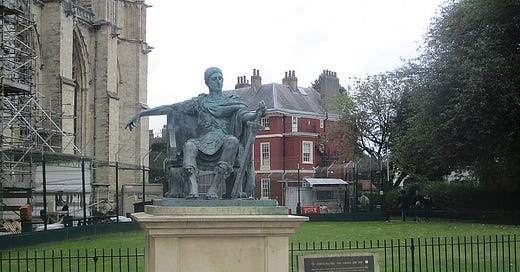When people ask me, what the purpose of the church is according to Anglicanism, I comically reply: “To humbly serve her majesty the queen, her subjects and successors, in the matter of religion.”
LOL. It is funny, cause it is (historically) kind of true.
For a long time, the Anglican church was effectively the chaplain to the British empire, which meant it was in a sense a Constantinian arrangement, i.e., an official marriage between empire and the church. In England, to this very day, the crown, through the prime minister and his/her advising committee, appoints bishops in the Church of England. It was arrangments such as this that the Anabaptists and American puritans rallied against in their quest for the separation of church and state.
Just to be clear, I think the separation of church and state is a good idea. Religion should not be a means to political power and political leaders should not tell people how to do their religion.
So most people today would be against the Constantinization of the church, that is, entering into a marriage between the church and state authorities.
Instead of seeking political power, I constantly hear that the church should be at the margins of society, standing up for the vulnerable, showing solidarity with the outcasts, and most important of all, speaking truth to power.
So, instead of a Constantinian arrangement, we need a prophetic witness from the margins. Instead of being in bed with the powers, we should speak truth to power.
Sounds great! However, there is a slight problem with the “prophet from the margins” view of the church.
What happens when you speak truth to power … and the power listens?
What happens when the political powers want a Christian vision of care for the poor, healthcare, welfare, protecting the vulnerable, or redistribution of surplus wealth?
Surely the purpose of speaking truth to power is to make the powers-that-be act Christianly in their governance! Yet seeking that influence is itself a form of Constantinization, fraught with risks and temptations, turning prophecy into a political platform, or requires trying to impose Christian values on people who are not Christians.
In effect, some degree of Constantization is desirable and inevitable if the church wants to influence the surrounding culture and see that influence carried over into public policy or even into law.
No matter how Anabaptist you are, no matter how much you might roll your eyes at the Anglican set up, as long as you want Government to do what is right according to Christian values, then the church-state divide is always going to get a bit blurry.
And here’s my thesis. Being Constantinian isn’t a positive or negative reading. It is more like a spectrum.
Theocracy —> Empire chaplain —> Niebuhrian cooperation —> Baptist —> Monastic
All Christians want to influence the state, the questions are: for what end, to what degree, at what cost, and how can they be held accountable?
Otherwise, the bigger question is, which Christianity should be the most influential in the public square? Now that, for my mind, is the more problematic aspect!
What about you? What do you think? Where on the spectrum would you sit?
If you like the post, sign up for the free weekly newsletter below. Also, for the price of one grande coffee a month, you can get premium content emailed to you every week.





As an American Baptist I definitely get your concern with hyper-separation. I’ll be thinking through this. I tend to be very much on the separation side, though definitely not to the Monastic level. I agree that we should be trying to influence things. A government that operates by godly wisdom is of course the goal. But when I see a worship of political power by many Christians, as I’ve seen many do with Trump and other politicians, it sometimes causes me to want the church to retreat to the margins again. But I have to beware of extremes here.
As a church of england member/ worship leader/ student it can be troubling. But the overlap of state and church gives our bishops a seat at Parliament. A chance to act as prophets calling politicians to account in a Christian way. The voice may not get listened to, but the bishops can act as a Christian balance to power, and help them remember the poor. Could this be done without the overlap in power? Probably. But for me it's what I have to work within. So I accept the good bits and pray for the rest